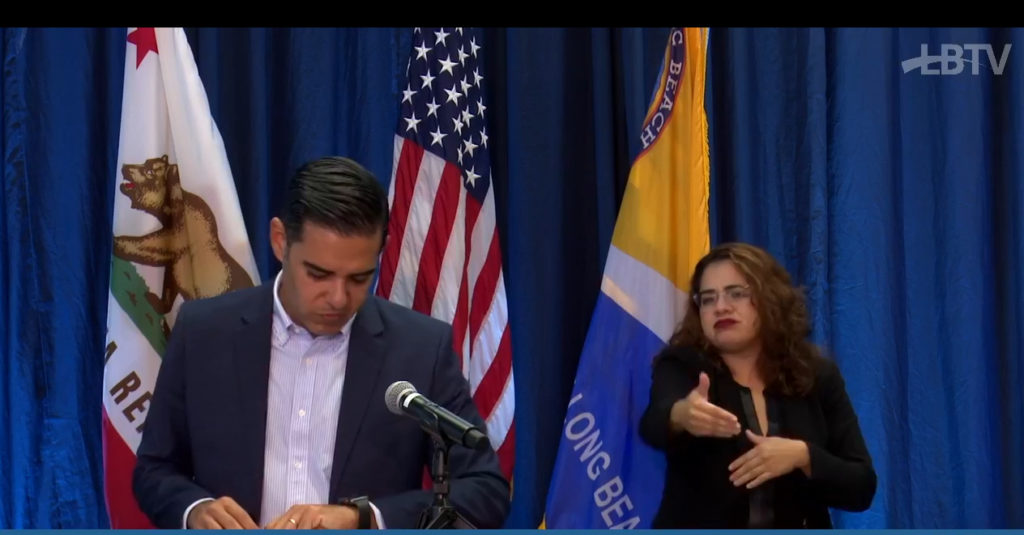
Long Beach Mayor Robert Garcia checks his watch during a COVID-19 press conference, Oct. 30 2020. Garcia has been criticized for not advocating for the collection of sexual orientation and gender identity data by the Long Beach Department of Health and Human Services. Photo: Screenshot.
For decades, many Californians have been asked to voluntarily provide their race, age, and sex on various health care forms, giving researchers vital demographic data that helps inform treatments and responses to public health crises.
But one group has been missing from those essential data groups.
LGBTQ+ community missing
Very little data is available for researchers on gay, lesbian, bisexual, trans, and queer Californians.
The reason? State law gives health officials the option to include LGBTQ demographic questions, such as sexual orientation and gender identity, on state and local health forms.
State Sen. Scott Wiener’s bill would require it.
“If we’ll recall back to the beginning of the pandemic, when we realized that older people were much more likely to die from COVID and when we realized that there were much higher rates of infection and death in Black and brown communities, the only reason we knew that was because we had demographic data,” Wiener (D-San Francisco) told the Assembly Public Health Committee last week. “Because when people would go seek health services, they were asked demographic questions.”
Why Senate Bill 957 is important
Senate Bill 957 would mandate California’s health officials to do what Wiener says they should have been doing anyway —Provide space on health care forms for people who identify as LGBTQ to voluntarily include their sexual orientation and gender identity information, also known as SOGI.
Senate Bill 957 would close a loophole that Wiener described as “a massive blind spot in the system” – and one that was not covered in legislation signed into law in 2020. In fact, a state auditor’s scathing report last year revealed that almost all of the dozens of state and local health care forms auditors examined omitted LGBTQ+ demographic questions, the report said.
Why SOGI data is essential
“This bill may seem like a relatively bureaucratic issue about adding a few boxes to some forms, and that’s true. But it also represents our recognition that sexual orientation and gender identity matters, that these are essential aspects of our lives that can affect how we access health care, what vulnerabilities we have, what our health risks and strengths are, and what we need,” Laura Thomas, of the San Francisco AIDS Foundation, told the health committee.
“Sexual orientation and gender identity data collecting ensures that local and state health departments and nonprofits have the information that we need to identify health disparities,” she said. We can’t address the problems that we can’t see, and we have to start asking the questions to start figuring out the answers.”
“This bill gives us data to ensure that scarce public health resources are effectively targeted to those who need them the most,” she said.
Long Beach, which has its own health department, has had problems implementing the SOGI data collection. Robert Garcia, the former mayor, was criticized for not pushing the health department to collect the data, and city leadership hasn’t taken any accountability for dropping the ball on the issue.
The audit noted that the California Department of Public Health has a new disease surveillance and reporting system that would improve reporting that’s scheduled to go live in 2025.
Local health officials, however, told auditors they needed state guidance about what data to collect, something Wiener’s bill would address by requiring them to collect sexual orientation, gender identity, and intersexuality data “on any forms or electronic data systems, unless prohibited by federal or state law,” according to the bill.
State health officials also would be required to give a public report detailing their progress to the Legislature.
What’s next
The health committee passed the bill 14-0.
It next goes to the Assembly Privacy and Consumer Protection Committee.
The bill passed through the Senate in the spring.
